Politics
How Stonewall Democratic Club retaliated against critics of its president
Stonewall Democratic Club is a powerful force in local politics, especially in the LGBTQIA+ enclave of West Hollywood.
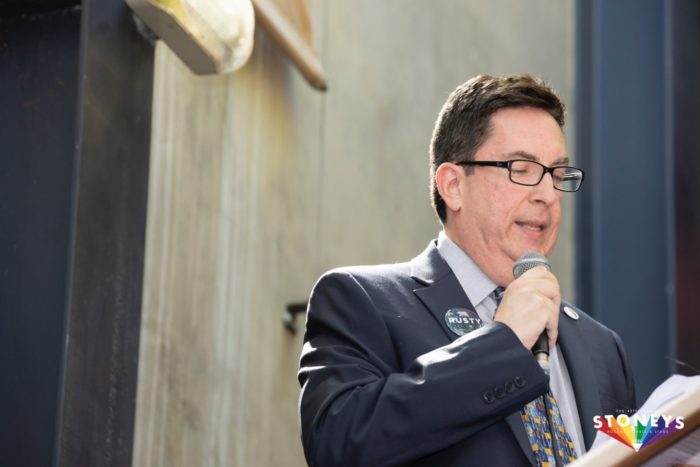

By Kate Gallagher | LOS ANGELES – “I know the ugly side of politics quite well. Any endeavor that involves human beings, there’s going to be mischief somewhere,” said Lauren Buisson. “The system feeds on cronyism and self-dealing, and that’s what I saw at Stonewall.”
Buisson was a member of Stonewall Democratic Club’s Steering Committee until she was dismissed from her position in October 2018. Her capital offense was calling out the racist, transphobic, and otherwise inappropriate Facebook posts made by the organization’s president, Lester Aponte — whose current campaign for a third term as Stonewall president has the support of dozens of elected officials and Democratic Party leaders.
Stonewall Democratic Club is a powerful force in local politics, especially in the LGBTQIA+ enclave of West Hollywood. The organization’s leadership includes high-ranking members of the local, state, and national Democratic Party. Each election cycle, candidates for everything from the Santa Monica School Board to the U.S. Senate vie for Stonewall’s endorsement, a symbolic stamp of approval from the LGBTQIA+ community.
But beneath the veneer of progressivism, several current and former Stonewall members describe a toxic environment of harassment, bigotry, and abuses of power, where dissent is silenced and misconduct is swept under the rug.
“It’s just a really twisted culture about personal gain, personal access, and nothing about advancing LGBT standards of living,” said Craig Scott, a lifelong LGBTQIA+ activist who served on Stonewall’s Steering Committee from 2017 to 2018. “
Sean Kolodji was an enthusiastic young activist when he joined Stonewall in 2009. He soon got involved in the membership team, where he was responsible for recruiting and credentialing new members. By 2015, he’d been appointed to the Steering Committee as Membership Chair. “I felt like we’re really fighting for something,” he said. “We’re fighting for LGBT rights, fighting for the trans community, fighting for diversity, and I was passionate.”
But cracks in the facade quickly started to show. In April 2017, Kolodji won a Stoney Award — the organization’s annual award ceremony/fundraiser — for Member of the Year. Eric Bauman, longtime Stonewall president and then-LACDP Chair, was also there to accept the Public Official of the Year Award.
Bauman, who later resigned as CDP Chair amid sexual misconduct allegations, was “very handsy with everyone,” Kolodji recalled. At one point during the dinner, Bauman began massaging Kolodji’s 20-year-old guest while still seated at the table.
According to several former members, Bauman’s inappropriate behavior was an open secret at Stonewall. None of the club’s leadership ever intervened.
“The pain that we experienced in dealing with the way Eric Bauman interacted — what example did he set for us about how we get power?” Kolodji said. “I feel like there was a structural problem, where we didn’t set the ground rules and say, look, within a professional space we can’t do this.”
That summer, Kolodji was elected to Stonewall’s Executive Team as Communications Vice President. Just days later, Gemmel Moore was found dead in the home of prominent Democratic donor and Stonewall Steering Committee member Ed Buck.
Kolodji, Scott, and Alex Paris, who served as Social Media Chair, pushed the club to publicly disavow Buck’s behavior, and to donate $500 (the cost of Buck’s lifetime Stonewall membership) to Moore’s funeral expenses. They received pushback from several other Steering Committee members, including Aponte, Garry Shay (who serves as the parliamentarian for both Stonewall and the LACDP), and John Erickson, now a member of West Hollywood City Council.
“There were a lot of people in the party that just wanted to be quiet,” Kolodji said. He recalled that, when Black activists posted on Stonewall’s Facebook page asking where the organization stood on Buck’s behavior, Aponte asked that the posts be deleted.
Even once the Steering Committee voted to put out a statement regarding Moore’s death, Aponte fought to soften the statement’s language and frame it around the dangers of drug addiction, rather than Buck’s suspicious role in Moore’s overdose.
“They didn’t want to kick [Buck] out because he gave so much money to the club,” said Scott. “Lester was always like, we can’t jump to conclusions, we need more information.”
Although Buck soon resigned from the Steering Committee, Moore’s death, and the tepid reactions from the rest of the club’s leadership, was a tipping point for Kolodji. “Those experiences together radicalized me a little bit,” he said. “This organization has something rotten at its core, and I can’t just go along with it.”
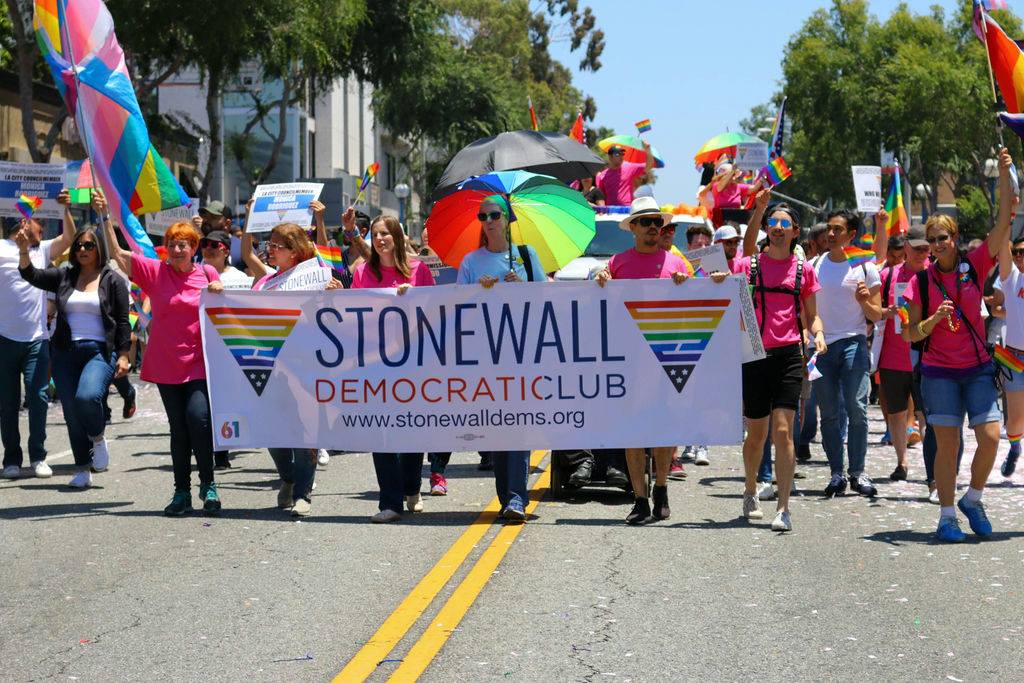
Lauren Buisson joined Stonewall in the summer of 2017, just after the Ed Buck scandal broke. “I actually went to some other [organizations’] events, and of all the ones I went to, the only person who chatted me up as a potential recruit was Sean.”
Kolodji and Buisson met at the annual Stonewall BBQ, hosted at the family home of State Assemblymember Reggie Jones-Sawyer. Buisson soon signed on to join Kolodji and Alex Paris on Stonewall’s communications team, where she managed the club’s social media and led writing and production on the Stonewall Spotlight podcast.
“Alex, Sean, and I worked really, really well together. We had the same social justice driven agenda,” Buisson recalled. “[But] I noticed the problems in the organization almost from the jump. And it especially became clear when the first crisis in the assembly happened.”
In late October 2017, Assemblymember Raul Bocanegra was accused of sexual misconduct. Just a week later, similar allegations surfaced against state Senator Tony Mendoza. After the news broke, Buisson, Paris, and Kolodji led an effort to convince the Steering Committee to draft a statement condemning the two officials’ behavior.
However, Eric Bauman, who at that point was no longer a member of Stonewall’s Steering Committee, stepped in and cautioned them not to move forward with the statement. Buisson found his involvement alarming.
“You had this guy who was himself a serial sexual harasser stepping into club business when he was no longer supposed to be involved,” she said. “Parts of the California Democratic Party like to assert that they have no control or association with the clubs. They absolutely do.”
The statement, drafted by Buisson, was eventually approved by a majority of the Steering Committee, over the objections of Aponte, Garry Shay, and Political Vice President Jane Wishon. As soon as the votes were in, Kolodji sent out the statement.
Immediately afterwards, Aponte confronted Kolodji for “going behind his back” by releasing the statement without his prior approval. Kolodji was baffled, since Aponte had put him in charge of counting the votes for the motion. “It showed that Lester and Garry and the power in the organization were uncomfortable with this kind of rebellion of the grassroots,” he said.
In the coming months, Buisson, Kolodji, Paris, and Scott frequently came into conflict with the rest of the Steering Committee. They were the only four Steering Committee members to vote against accepting a donation from Wells Fargo Bank, which had recently been rocked by a storm of scandals. Aponte ultimately decided to decline the donation after Kolodji leaked the news to LA Health Commissioner and former Stonewall Steering member Susie Shannon, who vagueposted about it on Facebook.
It gradually became clear to Paris that Stonewall’s leadership was “completely ignoring the important mission that this organization was started for… They’re more concerned with consolidating power, more concerned with glad-handing politicos and influence sharing than they are with actually helping LGBT people.”
The political disagreements sometimes turned personal. While discussing endorsements for the 2018 election, Scott, a longtime San Francisco resident, criticized Sen. Dianne Feinstein’s history of moderate positions and suggested that the octogenarian was getting too old to do her job effectively. In response, Erickson criticized Scott’s comments as “ageist” and sent an email to the Executive Team suggesting that Scott should be removed.
“We looked at it, and we were like, okay, this isn’t… this is silly, right?” Kolodji recalled.
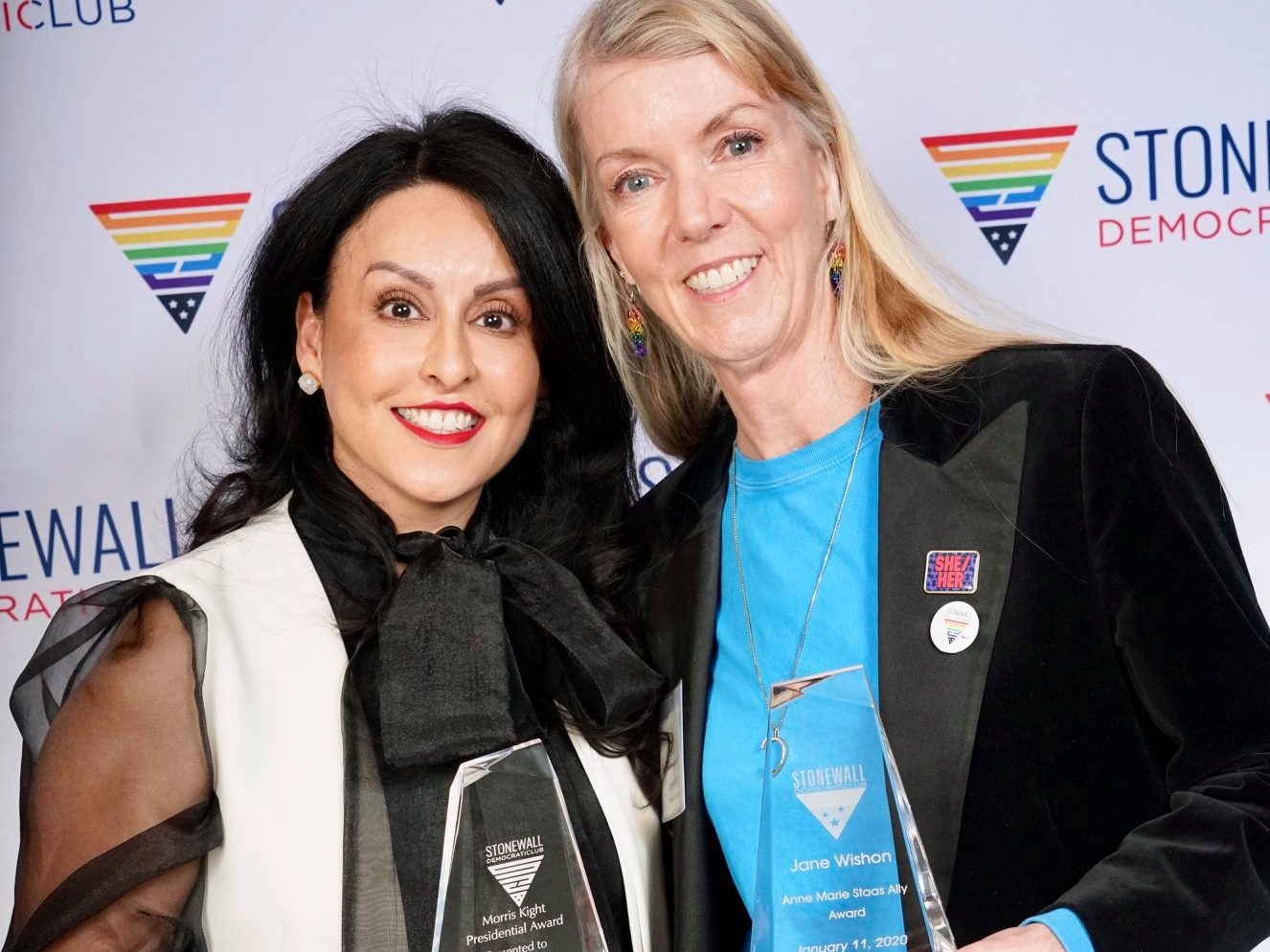
A more serious point of contention was the lack of diversity in Stonewall’s leadership. Of the eight elected officers, there’s currently only one who isn’t a cisgender man — Jane Wishon, who is a straight white woman. While officer positions are open to anyone, including straight allies, the lack of representation for LGBTQIA+ women within the club’s leadership is reflective of a larger problem, not just at Stonewall but in politics and LGBTQIA+ spaces in general.
In 2010, Aponte was on the board of a pro-marriage-equality organization called “Love, Honor, Cherish,” which crafted a failed ballot measure to overturn Proposition 8. The organization, which was entirely composed of cisgender gay men, failed to include any mention of gender identity in the measure.
In response to a Facebook post about the lack of trans-specific language, Aponte said that none of the over 100 activists who were involved in the discussions ever raised any concerns. He seemingly recognized the problem with the group’s lack of diversity without claiming any responsibility for fixing that problem, simply saying, “Obviously we needed some of you in the room. The door has always been open.”
To Hannah Howard, this sounded like a cop-out. Howard, who is trans, attended one Stonewall meeting in 2005, but decided not to engage further after being repeatedly misgendered during the meeting. She was surprised when, just a few years ago, a Stonewall member made a Facebook post about the reasons why trans people have trouble engaging with the movement — and Aponte responded with incredulity.
When Howard commented sharing her experience at the 2005 Stonewall meeting, Aponte “was shocked, disbelieving that such a thing could happen, but talking about [how] they were such great allies now,” she said.
However, according to current Steering Committee member Mackenzie Hussman, not much has actually changed. She recalled that, during a Pride event in 2018, a newer member of the Steering Committee, who is a trans woman, was working at Stonewall’s booth. An older man on the Steering Committee didn’t recognize her, and accused her of stealing from the booth. The incident was addressed awkwardly at the next Steering Committee meeting.
“Lester gave some sort of wash-overstatement like, ‘Oh we try to be inclusive of everyone.’ And then he proceeded to ask this trans woman how she would like to be treated,” Hussman recalled. “It just felt so insensitive. We’re an LGBT club, we should already know how to welcome trans members into our community. And she was publicly singled out in front of 30 people. It was embarrassing.”
In another example of Stonewall’s lukewarm commitment to inclusion, two Black LGBTQIA+ candidates, Steve Dunwoody and Ashley Marie Preston, intended to run in the 2018 special election for Assembly District 54. However, Wishon, as Vice President of Politics, made the decision that Stonewall shouldn’t endorse or support either candidate, because it would be “too divisive for us to choose between a Black gay man and a Black trans person,” according to Kolodji. In the end, neither candidate even made it onto the ballot.
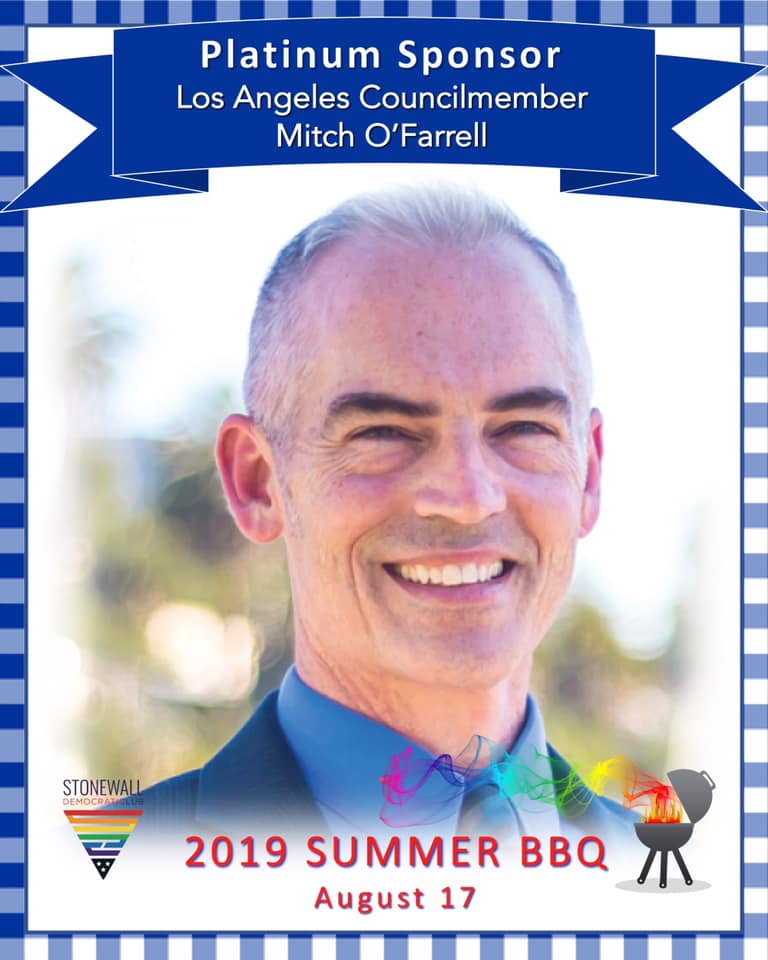
In April 2018, Buisson posted an article to the Steering Committee’s private Facebook group about the need for more Black women in Democratic Party leadership. All hell broke loose.
Shay replied that Buisson’s post was “not productive,” and instructed Operations Vice President Steve Bott to remove the post. When Buisson noticed it was gone, she posted the article again. It was removed again, and Buisson was blocked from further posting in the group.
“I’m 6’1″ and 245 pounds. I don’t let men tell me when I can talk and when I can’t,” said Buisson. “You could throw a brick and not hit a person of color at these general meetings. This was a problem we needed to address internally. And they refused.”
Buisson brought her concerns to Kolodji, who raised the issue with the rest of the Executive Team, including Aponte, Shay, Wishon, and Bott. All four replied that any criticism of the Democratic Party is unwelcome on the Steering Facebook page.
Kolodji repeatedly pointed out the irony of silencing a Black woman for calling out the Party’s silencing of Black women. Aponte, who is Puerto Rican, is the only person who responded to this point — he replied mystifyingly, “The real irony is that the only ethnic minority in this thread is me.”
At the time, Stonewall had no official grievance process — if Buisson wanted to press the issue further, it would be judged by the Steering Committee, which was overwhelmingly white and male.
Interestingly, Wishon had said that “no one is trying to censor Lauren on her own page,” and Aponte agreed that Buisson and Scott (whom no one else had mentioned) had “the entire wide world web” to post whatever they wanted. They quickly changed their stance on this.
Just a few weeks later, Scott shared a link to a video on his personal Facebook page with the comment, “Fag hags need to be checked so often.” The video depicted a brawl between a group of intoxicated white women and a group of queer men of color in an alley in West Hollywood.
However, the Executive Team interpreted Scott’s comment differently. Within hours, the officers had been looped into an email with the subject line “URGENT: Regarding post encouraging violence against women.”
Scott insisted that his comment was meant to condemn the violence. “There’s this ongoing debate within the LGBT, especially gay men, culture about the appropriateness of straight women and bridal showers going to gay spaces,” he told Knock LA. “So I just said you got to check your fag hags because you don’t want them beating up on queer people. I basically saw it as a gay bashing.”
Shay recommended that the board should immediately ask for Scott’s resignation. Wishon agreed. Attaching a screenshot of an unrelated Facebook comment by Buisson, she added, “And Lauren…”
By the next day, seven of the eight officers had signed a letter calling for Scott’s resignation. Kolodji was the only one who dissented. While he agreed that Scott’s post was “in very poor taste,” he told the rest of the Executive Team that he didn’t feel it was a resignation-worthy offense.
Neither did Scott, who deleted the post but refused to resign. At that point, the Executive Team (except Kolodji) motioned for the formation of an investigation committee to address the issue.
The committee presented its findings at Stonewall’s June 25 general membership meeting. The room was packed. “They called all the members who don’t normally show up, describing [Scott] as this misogynist who’s endorsing violence against women,” Buisson said.
LACDP Chair Mark Gonzalez was brought in to preside over the session. DNC member Laurence Zakson served as Parliamentarian. Scott himself chose not to attend the meeting, but Buisson led the defense on his behalf.
“It was a circus,” Kolodji said. One LACDP leader described the proceedings as “absurd.” At one point, West Hollywood City Councilmember John Heilman called impatiently from the back of the room, “Let’s vote already!”
In the end, the members voted, 48 to 14, to remove Scott from the Steering committee. That was the end of his involvement with Stonewall.
Regardless of whether or not Scott’s post should have been considered grounds for dismissal, the affair revealed a glaring double standard for whose inappropriate behavior is, or isn’t, punished. Just a year earlier, Stonewall had vigorously supported Eric Bauman’s campaign for CDP Chair, despite his well-known sexual misconduct.
“They all jumped on [Scott] because they wanted to get rid of a critical voice,” Buisson concluded.
Throughout the controversy, Kolodji had warned the rest of the Executive Team that “people in glass houses shouldn’t throw stones, so to speak. Be careful pursuing this with Craig, because this is an abuse of power, and you’re setting a precedent that is going to come back.”
Kolodji had been Facebook friends with Aponte for years, and he was aware of several posts Aponte had made that were just as offensive, if not worse than the comment that led to Scott’s removal. He mentioned this to Buisson, who began combing through Aponte’s most problematic posts.
In October 2011, Aponte posted a link to an article about Hermain Cain with the comment, “I hear the camp is iin [sic] the Spik Valley and overlooks Gook Mountain. Ain’t Texas grand?”
In November 2014, he posted an article about Mia Love, a Black Mormon Republican recently elected to Congress, commenting: “Until 1972, official Mormon Church doctrine was that Black people were evil and could not be saved. Perhaps this is their way of proving it?”
In 2015, he deliberately misidentified Ann Coulter as trans: “I am saying Ann Coulter is transgender. Go ahead and sue me.” The comments on the post became filled with vitriolic anti-trans and misogynistic remarks. Aponte did nothing to stop the hateful discussion.
In 2016, Aponte liked an anti-BLM post that said, “I think these people are assholes. There I said it. I’ve grown to despise BLM because of their tactics and narrative.”
In 2017, he joked that immigrant activists should be deported.
In 2018, Aponte described the Inclusive Pride Flag as “stupid.”
Buisson compiled 18 pages of screenshots of these and other inappropriate remarks. It was already clear to her that taking her concerns to the Steering Committee would be futile.
“It was not just about this one bigoted individual,” Buisson said. “It was infecting. You could see it in who was in the club, who was in leadership positions, who spoke from whom, who was excluded, the whole system was infected. And in my view at the time, that fish was rotting from the head.”
So, rather than rely on the club’s leadership to discipline themselves, Buisson sent the offending posts to several elected officials, asking them to withdraw their support for Stonewall until Aponte resigned.
Not a single official responded.
One of the recipients was Assemblymember Reggie Jones-Sawyer, host of the annual Stonewall BBQ — which was coming up in just a few weeks.
“My feeling was, as somebody with a reputation for advocating for the Black community, this man might be a little bit pissed off about these racist things,” Buisson said. “It would be no problem for him to say, this event is canceled until you resign. You’re out of Stonewall or doesn’t go forward.”
Jones-Sawyer’s office did reach out to Stonewall’s leadership — but not to demand Aponte’s resignation. Instead, they passed along Buisson’s letter, fingering her as a whistleblower.
A few weeks after her letter-writing campaign began, Buisson suddenly found herself locked out of Stonewall’s digital assets and social media accounts. Paris, who chaired the social media team, called Aponte in confusion. Aponte informed him that Buisson was no longer allowed to serve on the communications team.
“I said, what are you talking about, you’re just [removing] her?” Paris recalled. “And [Aponte] is like, ‘yeah, I can do that, I’m president.’ I was like… pretty sure you can’t.”
When Aponte realized that he could not, in fact, unilaterally remove Buisson from her Steering Committee position, he told Paris and Kolodji to ask for her resignation. They refused.
On September 26, Aponte sent an email to the full Steering Committee revealing that Buisson had sent letters to several elected officials accusing him of making “racist and bigoted statements.” Without revealing any details about the “statements” in question, Aponte called Buisson’s accusations “false and defamatory… harmful, not just to my personal reputation, but the reputation and public standing of our organization.” He asked that the Steering Committee vote on whether to expel Buisson from her position.
In stark contrast to Scott’s widely-publicized hearing, Buisson’s removal was handled quietly at a Steering Committee meeting on October 4. So quietly, apparently, that Wishon told Knock LA she didn’t remember the meeting had even happened — although the minutes confirm she was in attendance.
“There were wild allegations and actual shouting matches at this meeting,” Paris recalled. “That was an absurdly fireworks meeting over an issue that was not taken seriously.”
Buisson chose not to attend the meeting, but Paris and Kolodji argued on her behalf that the real problem at hand was Aponte’s behavior, not Buisson’s. Even if the committee didn’t feel that Aponte’s Facebook posts were grounds for resignation, his attempt to retaliate against Buisson was itself an abuse of power that warranted investigation.
However, other Steering Committee members said that Buisson should have brought the issue directly to them — which Kolodji found ludicrous, given their handling of Buisson’s previous complaints. “We tried to deal with this stuff internally,” he said. “But it seemed like their side was kind of like, ‘we’re gonna use our power — and we have more power — to essentially drive you out.”
The Steering Committee ultimately voted, 17 to 3, to remove Buisson from her position. Paris resigned the same day in protest. Kolodji soon disengaged from Stonewall as well.
“The organization just seemed destined to be an unredeemable mess,” Kolodji said. “Is there no shame, to just ruthlessly try to target someone that we need as a leader in queer spaces? And instead, what do we get?”
As a parting shot, Kolodji and Paris motioned for a separate investigation into Aponte’s Facebook posts. The motion was approved, and an Ad Hoc Incident Review Committee was formed to review the posts. The five-member committee included Aponte’s longtime ally, Garry Shay.
Knock LA obtained a copy of the investigation’s report, which was finalized in June 2019 and sent only to the eight members of the Executive Team. In Aponte’s statement to the committee, he defends each of his insensitive posts, which he maintains are not “racist [or] bigoted.” He claims Buisson only called out his comments because of a “personal vendetta.”
The committee’s assessment notes that Aponte’s posts are in “poor taste” and that each of the committee members would “know better than to make these kind of comments.” However, they largely accept Aponte’s justifications, some of which strain credulity (in one example, he insists that his sarcastic use of racial slurs “was in no way meant to condone the use of racial slurs in place names, but rather the opposite.” He doesn’t elaborate further.)
Ultimately, the committee decides that the posts are not grounds for Aponte’s removal. The report concludes: “What appears most important now is to move forward from this point.”
It’s unclear whether the investigation’s findings were ever revealed to the full Steering Committee or the membership at large. Wishon claims the investigation’s report was presented at a general membership meeting; however, Knock LA reviewed the minutes for every meeting from 2018 to June 2021, and there is no mention of the incident review committee’s existence.
According to a current Steering Committee member, at some point Aponte made a brief apology and deleted the Facebook posts, but that’s where the consequences ended. In May 2019, Aponte was nominated, unopposed, for a second term as president. Three of the five members of the official nominating committee were also involved in the incident review committee, whose investigation into Aponte was still ongoing.
Ultimately, Aponte was reelected, and his now-deleted racist Facebook posts were seemingly never mentioned again. During this same time, however, Stonewall was implicated in a wave of controversies that weren’t so easily swept under the rug.
In November 2018, Eric Bauman resigned as CDP Chair after an onslaught of sexual harassment allegations. In January 2019, a second body was found in Ed Buck’s apartment. Later that year, a third victim narrowly escaped from Buck’s home alive, and Buck was finally arrested. He was eventually indicted on nine counts by a federal grand jury, and his trial is currently underway.
Meanwhile, in November 2020, John Erickson, a major player in several of Stonewall’s internal scandals, was elected to West Hollywood City Council, thanks in part to the resources that came along with his endorsement by Stonewall. Notably, four of the eight eligible candidates were inexplicably barred from participating in Stonewall’s endorsement process, and although two council seats were open, Stonewall’s membership voted to endorse only Erickson — Sepi Shyne, an LGBTQIA+ woman of color, failed to reach the 60% vote threshold for endorsement.
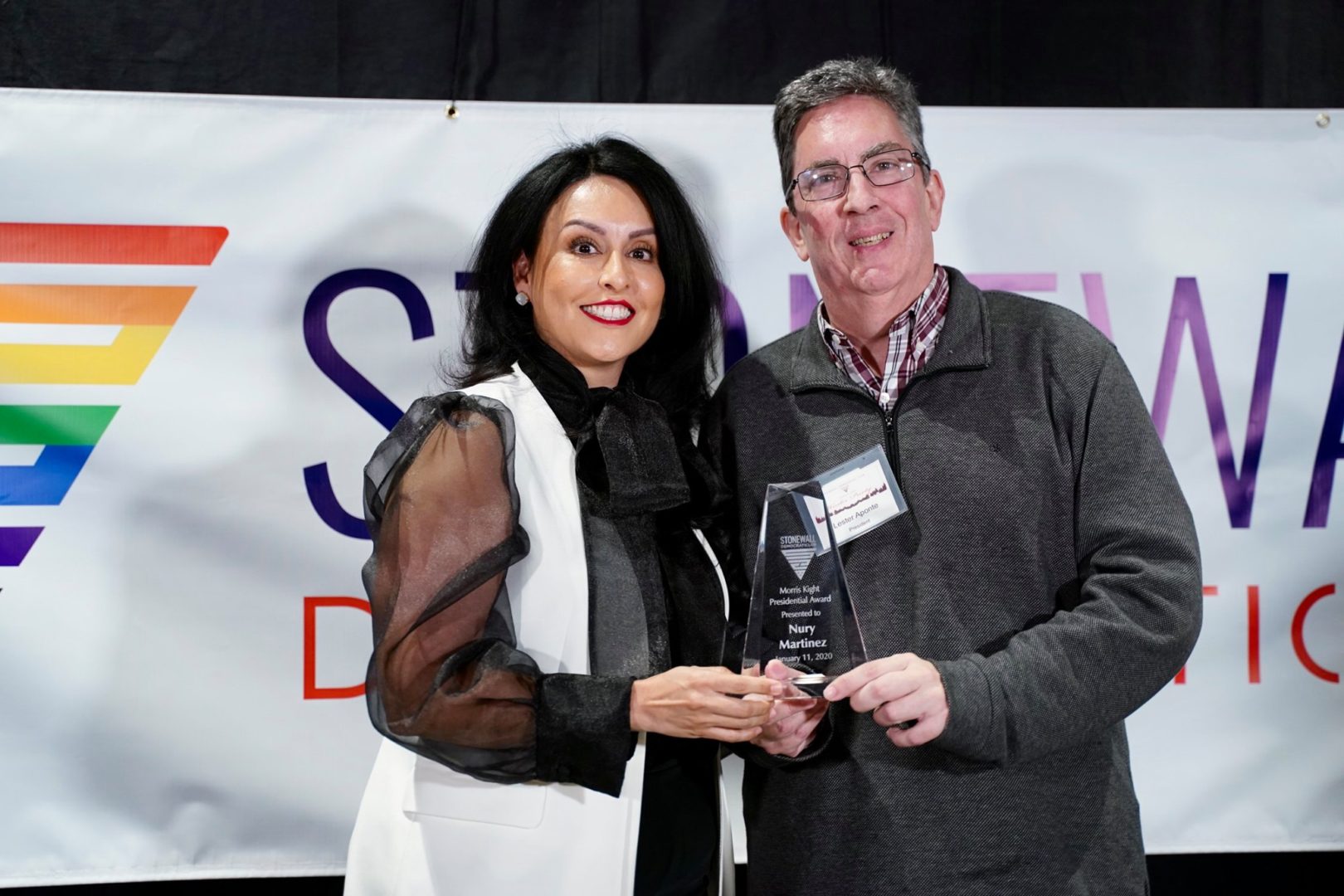
On May 24, Aponte announced his candidacy for a third term as Stonewall president. Interestingly, the same day as his announcement, he changed his Facebook cover photo to the Inclusive Pride flag that he previously decried as “stupid.” His slate, which is running on a platform of diversity and inclusion, includes five men and one straight woman (Wishon).
This time, however, Aponte isn’t the only candidate in the running — although he was chosen by the official nominating committee, another Stonewall member submitted a nomination for Alex Mohajer, who currently serves as Chair of Public and Media Relations.
According to Mackenzie Hussman, this year’s election has been tense from the very beginning, when the nominating committee itself was being chosen. “I felt rushed,” she said. “They were trying to put select people through who would nominate whoever [the current officers] wanted to.”
When other Steering Committee members spoke up and suggested different names for the nomination committee, there was procedural confusion. “They were just shocked that people would not go with what they were saying,” Hussman said. “It’s just been very key prominent people running this club without check or challenge, and now there’s people challenging them. You can tell they feel threatened.”
Hussman notes that Aponte has personally blocked several Steering Committee members on Facebook, ostensibly for opposing his campaign for reelection. In a blast of deja vu, Hussman, who is Chair of Social Media, and another communications team member were both inexplicably locked out of Stonewall’s social media accounts on July 12 with no explanation, although their access was restored when the issue was brought to Operations VP Bott’s attention.
According to Hussman, the only people who could have revoked the access are Bott, Aponte, and Wishon. When Knock LA asked Wishon about the incident, she explained vaguely, “The Operations team examined all our permissions on the website and socials. Two members were moved to different permissions on [Facebook], but as soon as Operations was made aware that the previous level was required in order to stream they were moved back to their original levels.”
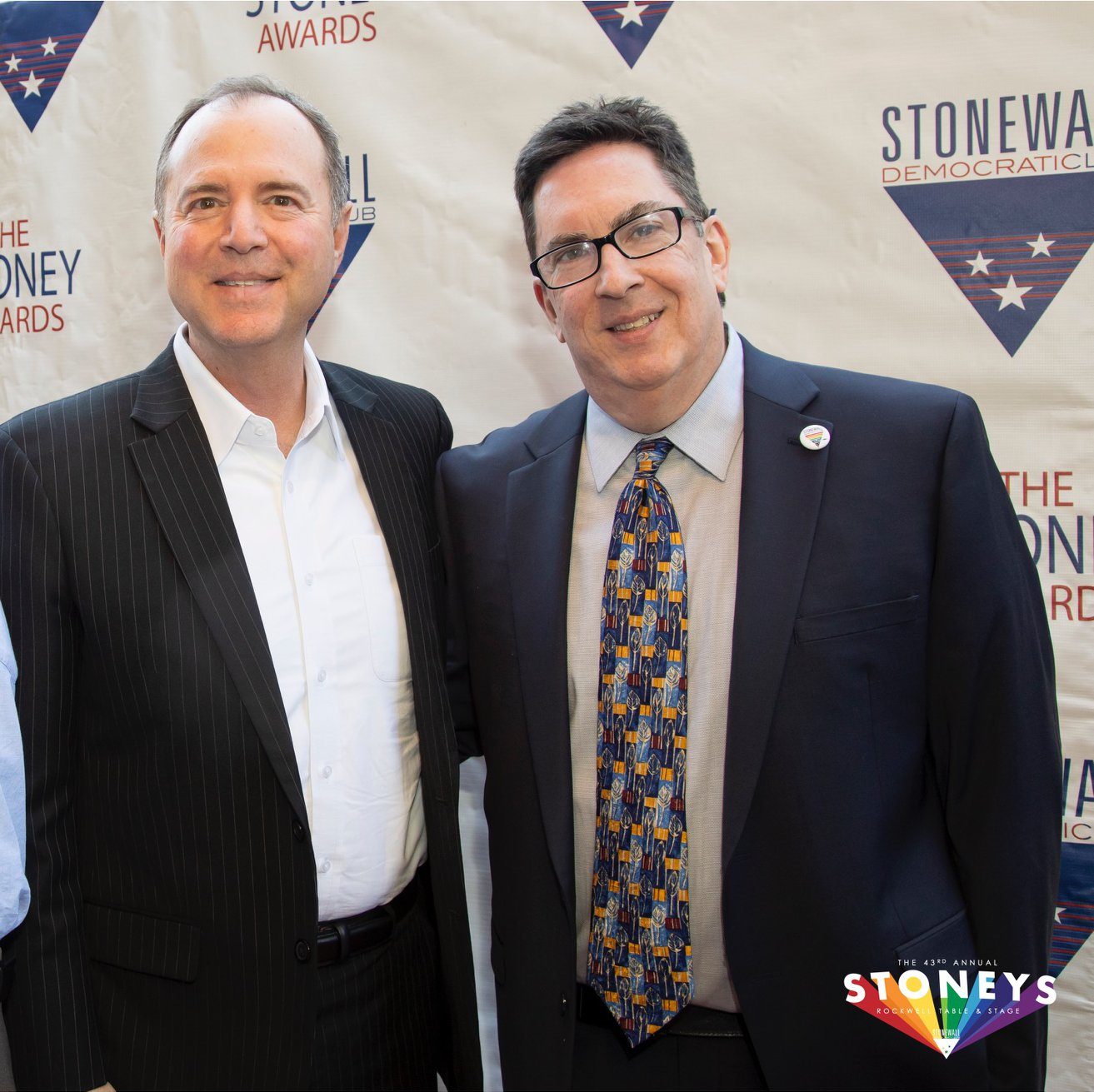
Despite the internal dissent, Aponte still enjoys widespread support from the Democratic establishment. His reelection campaign has been endorsed by John Erickson; West Hollywood Mayor Lindsey Horvath; State Assemblymembers Reggie Jones-Sawyer, Laura Friedman, Jesse Gabriel, and Isaac Bryan; State Senators Ben Allen, Anthony Portantino, and Sydney Kamlager; LA City Councilmembers Paul Koretz and Mike Bonin; LA County Supervisor Holly Mitchell; LACDP Chair Mark Gonzalez; CDP Executive Director Yvette Martinez; and at least six DNC members.
As this roster of supporters suggests, the implications of Stonewall’s internal drama extend far and wide through state and local politics.
To Buisson, the problems at Stonewall are emblematic of a larger problem with how the Democratic Party treats marginalized communities, particularly the Black women on whose votes and volunteer labor they rely. She notes that the refusal to prioritize the needs of diverse communities could be an existential threat to the Party’s survival.
“Juneteenth does not make up for George Floyd. And Kamala Harris does not make up for all the slights that women of color suffer,” she said. “[Last year], the entire region went ultra progressive. We had a record turnout. And yet they’re still trying to preach to us, you know, what the well-heeled people want. You think that they would realize where this is headed… The younger voters are willing to suffer through a Republican administration to teach the Democrats a lesson.”
But perhaps one of the most worrying consequences of Stonewall’s toxic culture is the impact on the LGBTQIA+ community. “I don’t want these creeps mentoring our queer youth. I don’t want them jaded and cynical after their first election,” Buisson said. “We can’t have vulnerable people having weak leaders or corrupt leaders. That does harm to our children and makes them even more isolated.”
“I think at the end of the day, this is about restoring the important place that organizations like Stonewall play in the progressive movement,” Paris added. “We can sit by and let the party apparatus do what it’s going to do to protect its insular interests, or we can stand up and fight back for the interests of the people that the party proclaims that it is in service of.”
Buisson believes the first step is to expel Aponte, not just from Stonewall, but from the CDP, where he currently serves as co-chair of the LGBT Caucus. Beyond that, she suggests that the LACDP should temporarily revoke Stonewall’s charter — essentially disaffiliating the organization from the Democratic Party — until the internal issues are addressed.
This seems unlikely to happen, given that the LACDP’s executive director and parliamentarian are both members of Stonewall’s Executive Team, and LACDP Chair Mark Gonzalez has endorsed Aponte’s reelection campaign. But Buisson is hopeful that public pressure from elected officials could be enough to turn the tide and hold Aponte accountable.
“It’s one call from one of them… to the chair of the state party, to expel him, and to sanction Stonewall,” Buisson said. “It’s one call [from] one elected. That’s all it takes. And I’m laying down that gauntlet. Which one of you is it going to be?”
Knock LA contacted Aponte, who responded with a completely blank email. Garry Shay declined to comment. John Erickson didn’t respond to requests for comment.

Kate Gallagher is a freelance journalist and writer based in Los Angeles. She is also a Senior Content Writer for Parcast Studios on Spotify.
Gallagher is a graduate of the University of Iowa with a Bachelor of Arts degree in English Language and Literature.
The preceding article was published at KnockLA, a Los Angeles based non-profit community journalism project and is republished by permission.
Congress
White House finds Calif. violated Title IX by allowing trans athletes in school sports
Education Department threatens ‘imminent enforcement action’

The Trump-Vance administration announced on Wednesday that California’s Interscholastic Federation and Department of Education violated federal Title IX rules for allowing transgender girls to compete in school sports.
In a press release, the U.S. Department of Education’s Office of Civil Rights threatened “imminent enforcement action” including “referral to the U.S. Department of Justice” and the withholding of federal education funding for the state if the parties do not “agree to change these unlawful practices within 10 days.”
The agency specified that to come into compliance; California must enforce a ban excluding transgender student athletes and reclaim any titles, records, and awards they had won.
Federal investigations of the California Interscholastic Federation and the state’s Department of Education were begun in February and April, respectively. The Justice Department sued Maine in April for allowing trans athletes to compete and refusing a similar proposal to certify compliance within 10 days.
Broadly, the Trump-Vance administration’s position is that girls who are made to compete against trans opponents or alongside trans teammates are unfairly disadvantaged, robbed of opportunities like athletics scholarships, and faced with increased risk of injury — constituting actionable claims of unlawful sex discrimination under Title IX.
This marks a major departure from how the previous administration enforced the law. For example, the Department of Education issued new Title IX guidelines in April 2024 that instructed schools and educational institutions covered by the statute to not enforce categorical bans against trans athletes, instead allowing for limited restrictions on eligibility if necessary to ensure fairness or safety at the high school or college level.
Sports aside, under former President Joe Biden the department’s Office of Civil Rights sought to protect against anti-LGBTQ+ discrimination in education, bringing investigations and enforcement actions in cases where school officials might, for example, require trans students to use restrooms and facilities consistent with their birth sex or fail to respond to peer harassment over their gender identity.
Much of the legal reasoning behind the Biden-Harris administration’s positions extended from the 2020 U.S. Supreme Court case Bostock v. Clayton County, which found that sex-based discrimination includes that which is based on sexual orientation or gender identity under Title VII rules covering employment practices.
A number of high profile Democrats, including California Gov. Gavin Newsom, have recently questioned or challenged the party’s position on transgender athletes, as noted in a statement by Education Secretary Linda McMahon included in Wednesday’s announcement.
“Although Gov. Gavin Newsom admitted months ago it was ‘deeply unfair’ to allow men to compete in women’s sports, both the California Department of Education and the California Interscholastic Federation continued as recently as a few weeks ago to allow men to steal female athletes’ well-deserved accolades and to subject them to the indignity of unfair and unsafe competitions.”
Congress
Garcia elected top Democrat on the House Oversight Committee
Gay Calif. lawmaker vows to hold Trump-Vance administration accountable

U.S. Rep. Robert Garcia (D-Calif.) on Tuesday was elected top Democrat on the House Oversight Committee in a vote that signaled the conference’s overwhelming support for a newer voice on Capitol Hill who will play a key role taking on President Donald Trump.
With a margin of 150-63, the 47-year-old openly gay congressman defeated U.S. Rep. Stephen Lynch (D-Mass.), alongside U.S. Reps. Jasmine Crockett (D-Texas) and Kweisi Mfume (D-Md.) who exited the race after the House Democratic Steering and Policy Committee backed Garcia.
Serving only since 2023, the congressman has had a remarkably quick ascent leading up to his election this week as ranking member of one of the most powerful House committees, awarded a leadership position serving under House Democratic Whip Katherine Clark (Mass.) and selected as a co-chair of former Vice President Kamala Harris’s 2024 presidential campaign.
Democratic members began jockeying for the top seat on the oversight committee this spring after the late-U.S. Rep. Gerry Connolly of Virginia stepped away amid news that his esophageal cancer had returned. He died in May.
Connolly last year fended off a challenge from one of the most well known House Democrats, U.S. Rep. Alexandria Ocasio-Cortez (N.Y.), though with a narrower margin that signaled intra-party tensions over whether leadership roles should still be awarded based on seniority.
Garcia positioned himself as a bridge between the two camps — a consensus candidate with executive managerial experience as the former mayor of Long Beach. At the same time, particularly since the start of Trump’s second term, the congressman has emerged as one of the most outspoken critics of the new Republican regime.
In a statement on X Tuesday, Garcia thanked his colleagues and promised to “hold Donald Trump and his administration accountable.”
I'm honored to have been elected by @HouseDemocrats to serve as Ranking Member on @OversightDems.
— Congressman Robert Garcia (@RepRobertGarcia) June 24, 2025
We will hold Donald Trump and his Administration accountable for their corruption – and work to make our government more effective for the American people.
Let's get to work.
If Democrats win control of the House next year, the oversight committee will be able to exercise powers that are now available only to Republicans under the chair, U.S. Rep. James Comer (R-Ky.), which include the authority to investigate virtually any matter across the federal government, to issue subpoenas, and to compel testimony.
In the meantime, Garcia on Monday promised that Democrats on the committee would “vigorously fight” Republican Speaker Mike Johnson’s (La.) plans “to dismantle the Government Accountability Office.”
Congress
Padilla forcibly removed from federal building for questioning DHS secretary
Prominent Democrats rushed to defend senator

Democratic U.S. Sen. Alex Padilla of California was forcibly removed from a federal building in Los Angeles after attempting to ask questions of U.S. Homeland Security Secretary Kristi Noem during a press conference on immigration Thursday
The city has been rattled in recent days as protestors objecting to the Trump-Vance administration’s immigration crackdowns clashed with law enforcement and then the president deployed National Guard troops and U.S. Marines, which was seen as a dramatic escalation.
According to a video shared by his office, the senator, who serves as ranking member of the Senate Judiciary Immigration Subcommittee, introduced himself and said, I have questions for the secretary.” After he was pushed out of the room, officers with FBI-identifying vests told Padilla to put his hands behind his back and handcuffed him.
“Senator Padilla is currently in Los Angeles exercising his duty to perform Congressional oversight of the federal government’s operations in Los Angeles and across California,” reads a statement from his office.
“He was in the federal building to receive a briefing with General Guillot and was listening to Secretary Noem’s press conference,” the statement continued. “He tried to ask the secretary a question, and was forcibly removed by federal agents, forced to the ground and handcuffed. He is not currently detained, and we are working to get additional information.”
Democrats were furious, with many releasing strong statements online condemning the actions of law enforcement officers, including California Gov. Gavin Newsom (D), Los Angeles Mayor Karen Bass (D), and the state’s other U.S. senator, Adam Schiff (D).
Human Rights Campaign Chief of Staff Jay Brown also issued a statement: “A sitting U.S. senator should be allowed to ask a Cabinet secretary a question at a press conference — in his own state, on an issue affecting his constituents — without being violently thrown to the floor and handcuffed. Everyone who cares about our country must condemn this undemocratic act. Full stop.”
Congress
51 lawmakers sign letter to Rubio about Andry Hernández Romero
U.S. Rep. Robert Garcia (D-Calif.) spoke about gay Venezuelan asylum seeker

Forty nine members of Congress and two U.S. senators, all Democrats, signed a letter Monday to Secretary of State Marco Rubio demanding information about Andry Hernández Romero, a gay Venezuelan national who was deported to El Salvador and imprisoned in the country’s notorious Terrorism Confinement Center, a maximum-security prison known by the Spanish acronym CECOT
“We are deeply concerned about the health and wellbeing of Mr. Hernández Romero, who left Venezuela after experiencing discriminatory treatment because of his sexual orientation and opposition to Venezuela’s authoritarian government,” the lawmakers wrote. They urged the State Department to facilitate his access to legal counsel and take steps to return him.
After passing a credible fear interview and while awaiting a court hearing in March, agents with U.S. Immigration and Customs Enforcement reportedly transported Hernández out of the U.S. without due process or providing evidence that he had committed any crime.
In the months since, pressure has been mounting. This past WorldPride weekend in Washington was kicked off with a rally in front of the U.S. Supreme Court and a fundraiser, both supporting Hernández and attended by high profile figures including members of Congress, like U.S. Rep. Mark Takano (D-Calif.)
U.S. Rep. Robert Garcia (D-Calif.) was among the four members who wrote to Rubio about Hernández in April. On Friday, he spoke with the Los Angeles Blade before he and his colleagues, many more of them this time, sent the second letter to Rubio.
“There’s a lot of obviously horrible things that are happening with the asylum process and visas and international students and just the whole of our value system as it relates to immigration,” he said, which “obviously, is under attack.”
“Andry’s case, I think, is very unique and different,” the congressman continued. “There is, right now, public support that is building. I think he has captured people’s attention. And it’s growing — this is a movement that is not slowing down. He’s going to be a focal point for Pride this year. I mean, I think people around the world are interested in the story.”
Garcia said he hopes the momentum will translate to progress on requests for proof of life, adding that he was optimistic after meeting with Hernández’s legal team earlier on Friday.
“I mean, the president, Kristi Noem, Marco Rubio — any of these folks could could ask to see if just he’s alive,” the congressman said, referring to the secretary of Homeland Security, whom he grilled during a hearing last month. ICE is housed under the DHS.
“People need to remember, the most important part of this that people need to remember, this isn’t just an immigration issue,” Garcia noted. “This is a due process issue. This is an asylum case. We gave him this appointment. The United States government told him to come to his appointment, and then we sent him to another country, not his own, and locked him up with no due process. That’s the issue.”
Garcia said that so far neither he nor his colleagues nor Hernández’s legal team were able to get “any answers from the administration, which is why we’re continuing to advocate, which is why we’re continuing to reach out to Secretary Rubio.”
“A lot more Democrats are now engaged on this issue,” he said. U.S. Sens. Adam Schiff and Alex Padilla, both from California, joined Monday’s letter. “The more that we can get folks to understand how critical this is, the better. The momentum matters here. And I think Pride does provide an opportunity to share his story.”
Asked what the next steps might be, Garcia said “we’re letting his legal team really take the lead on strategy,” noting that Hernández’s attorneys have “already engaged with the ACLU” and adding, “It’s very possible that the Supreme Court could take this on.”
In the meantime, the congressman said “part of our job is to make sure that that people don’t forget Andry and that there is awareness about him, and I think there’s a responsibility, particularly during WorldPride, and during Pride, all throughout the month — like, this is a story that people should know. People should know his name and and people should be aware of what’s going on.”
Breaking News
Controversy brews in the City of Glendale over support of Pride event
Republican Mayor Ara Najarian pushes back on funding family-friendly Pride event
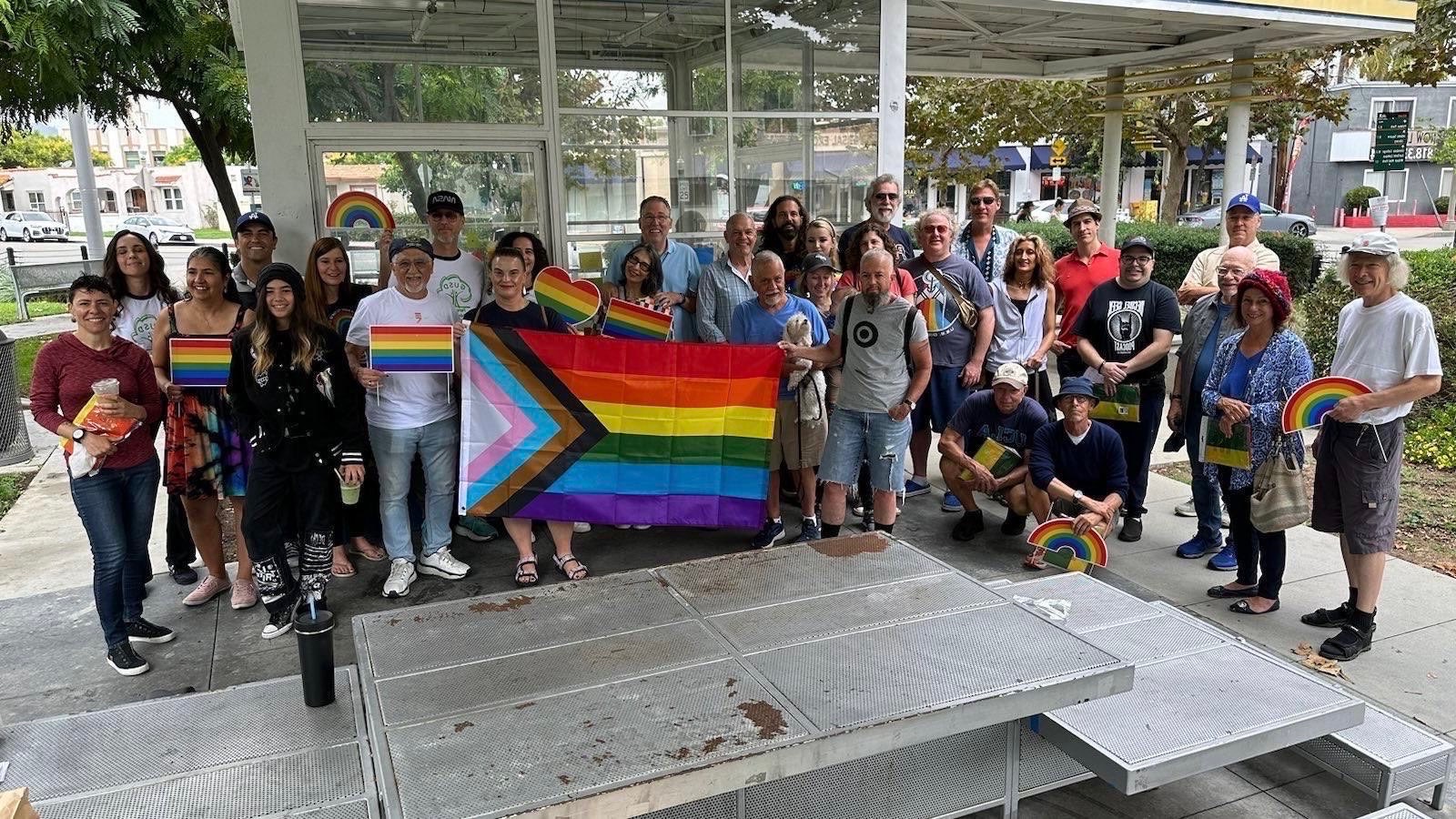
Over the last three weeks, glendaleOUT — a local LGBTQ group based in Glendale, California and city leadership have been at odds over securing financial support of a family-friendly Pride event set to happen on Saturday, June 7. As of Tuesday, Glendale’s city council voted 3-2 in favor of funding the event, ending a weeks-long argument over securing the funds.
The controversy began when the group highlighted how neighboring cities have visibly demonstrated support for Pride Month celebrations across the county, while the City of Glendale has yet to sponsor events with banners, city logos and financial sponsorship.
Councilmember Dan Brotman proposed $5,000 in sponsorship funds, noting that the city has funded other cultural events with much larger amounts.
Local leaders, but specifically Mayor Ara Najarian — who was just re-elected for a fifth term — are pushing back and opposing the proposal for funding. According to sources, Mayor Najarian openly opposed the proposal, stating a distant conflict of interest as the reason for the opposition.
LGBTQ advocates have been quoted as saying this is a “bad-faith political tactic, not grounded in any real conflict of interest.”
The next potential vote is expected to happen today at a city council meeting. Organizers say that the Pride event will happen regardless, but that they still hope to shed light on the patterns of sexual orientation-based discrimination in the city council.
For more information about the free community Pride event, visit glendaleOUT’s website.
California
LA County officially kicks off Pride Month with blessing from The Sisters of Perpetual Indulgence
‘This needs to be done, because once again, our county and our nation houses people who want us gone, who wish us harm’
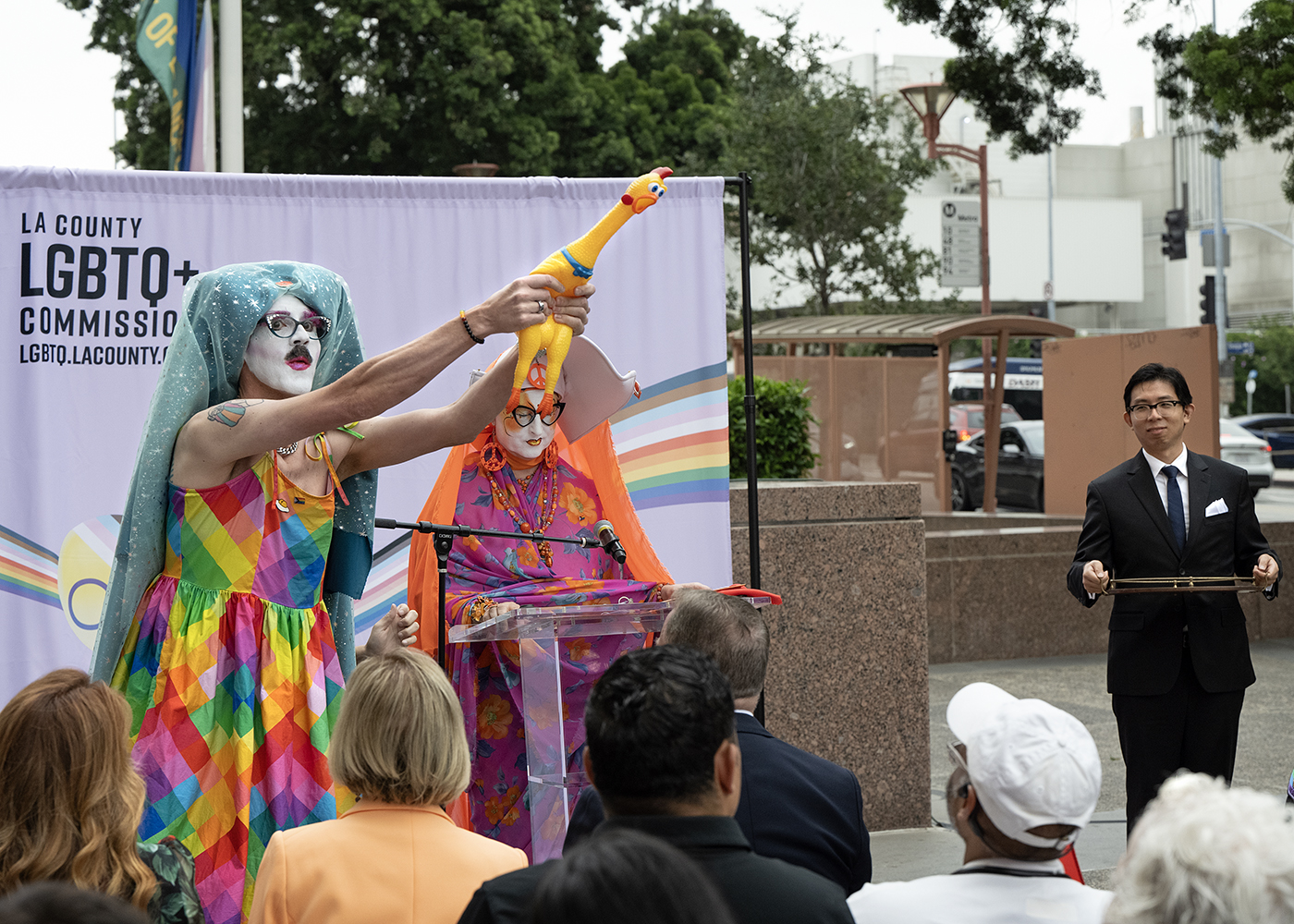
The LA County Board of Supervisors and the LA County LGBTQ+ Committee gathered on Tuesday, June 3, to officially kick off Pride Month across the county with a blessing from The Sisters of Perpetual Indulgence, who purified the space with their sacred chicken, then led everyone in blessing the Progress Pride flag before raising it at the Kenneth Hall of Administration.
“By raising this flag, the emblem of our souls and of our souls, of our love, of our survival, and of the gifts we offer to every Angeleno in this county — you all declare and you declare to everyone both here and abroad, that we are your people and you affirm that this is our home too,” said Sister Unity. “This needs to be done, because once again, our county and our nation houses people who want us gone, who wish us harm.”
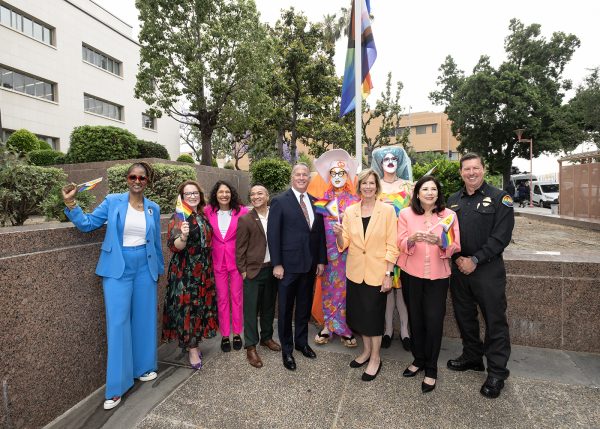
LA County Supervisors and other community leaders gathered on Tuesday at the Kenneth Hall of Administration to raise the Progress Pride flag in honor of Pride Month. (Photo credit to Diandra Jay)
Supervisors Janice Hanh, Holly J. Mitchell, Lindsey P. Hovarth and Hilda L. Solis spoke on the importance of representation in the face of discrimination, homophobia and transphobia.
Supervisor Hahn mentioned in her speech that her father, Kenneth Frederick Hahn designed the LA County flag and it was clear to her that he believed that a flag was more than just a piece of fabric.
“My dad, the original Supervisor Hanh, designed the LA County flag and he understood that a flag is not just fabric. A flag is a symbol. It’s a visual representation of who we are, what we value and what we stand for.”
Two years ago, Supervisor Hahn started the tradition to raise the flag alongside the one her father designed and then it was Supervisor Horvath who suggested that the Pride flag be flown on all county facilities across Los Angeles.
“Now, in every corner of our vast county — from our lifeguard stations on our beaches, to every library, fire station — and may I add: all eight county buildings in the city of Downey. Wherever there is a county facility, the Progress Pride flag will send a clear, powerful message to our LGBTQ residents: ‘your county government unequivocally and unapologetically has your back.’”
The comment about the city of Downey is in regards to a controversial Pride flag ban that was enacted last year.
Supervisor Hahn then introduced LA County Assessor Jeff Prang, one of the longest-serving, out, elected officials in the state of California. Due to his long history in government and as a member of the LGBTQ community, Assessor Prang helped launch the LA County LGBTQ Elected Officials Association with over 50 active members from all levels of government.
“We are in a moment of crisis in the nation. Across the country, an extremist movement is working to dismantle LGBTQ rights — from banning books to criminalizing gender-affirming care, to silencing drag performers, to targeting our youth and families with cruelty disguised as policy,” said Assessor Prang. “These are not isolated incidents, this is a campaign of fear and repression.”
Héctor Trinidad-Plascencia, the Chair of LGBTQ+ Commission, encouraged attendees who are not from the queer and trans communities, to remove the blockages that keep them from being in solidarity with queer and trans people.
“With your solidarity, we are creating a different world together starting in our county home and for the nation to follow,” they said.
White House
DOJ launches investigation into Calif. trans student-athlete policy
State AG vows to defend Golden State laws
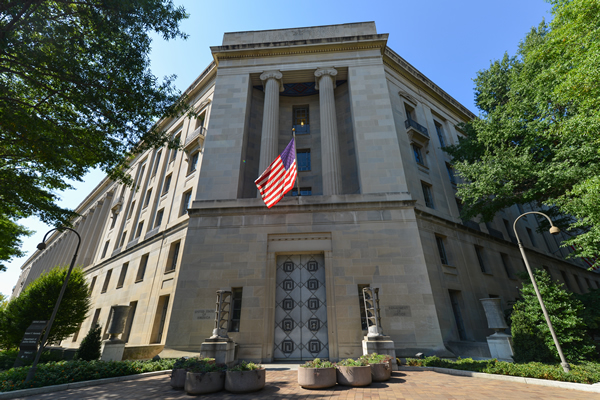
One day after President Donald Trump threatened to strip California of “large scale federal funding” over its policy on transgender student-athletes, his Justice Department announced it is investigating the state for potentially violating Title IX.
“The investigation is to determine whether California, its senior legal, educational, and athletic organizations, and the school district are engaging in a pattern or practice of discrimination on the basis of sex,” the DOJ said in a statement.
The DOJ said it notified State Attorney General Rob Bonta, State Superintendent of Public Instruction Tony Thurmond, the Jurupa Unified School District, and the California Interscholastic Federation of its investigation.
AB Hernandez, 16, is an out trans female student-athlete at Jurupa Valley High School who qualified for this weekend’s state track and field championship. As the Los Angeles Blade reported earlier this week, the CIF announced a change in the rules at the finals to accommodate girls who were displaced by Hernandez, including giving medals to cisgender competitors who earn a podium spot should Hernandez place ahead of them.
“We remain committed to defending and upholding California laws and all additional laws which ensure the rights of students, including transgender students, to be free from discrimination and harassment,” said Bonta in a statement. “We will continue to closely monitor the Trump administration’s actions in this space.”
As KTLA reported, California is one of 22 states that allow trans student-athletes to participate in sports consistent with their gender identity. Former Gov. Jerry Brown signed that policy into law in 2013.
The DOJ announced it is also now supporting a federal lawsuit targeting Bonta and the state Department of Education, claiming that California law and CIF policy discriminate against cisgender girls by allowing trans female athletes to compete according to their gender identity.
The lawsuit was filed by a conservative law group, Advocates for Faith and Freedom, representing the families of two girls at Martin Luther King High School in Riverside. Their suit claims the school’s cross-country team dropped one athlete from her varsity spot in favor of a trans athlete and that school administrators compared their “Save Girls Sports” T-shirts to swastikas.
Officials in Washington also weighed-in, referring to trans girls and women as “males.”
“Title IX exists to protect women and girls in education,” said Assistant U.S. Attorney General for Civil Rights Harmeet K. Dhillon. “It is perverse to allow males to compete against girls, invade their private spaces, and take their trophies.”
“The law is clear: Discrimination on the basis of sex is illegal and immoral,” said U.S. Attorney Bill Essayli. “My office and the rest of the Department of Justice will work tirelessly to protect girls’ sports and stop anyone — public officials included — from violating women’s civil rights.”
According to Gov. Gavin Newsom’s office, out of the 5.8 million students in California’s K-12 public school system, the number of active trans student-athletes is estimated to be in the single digits.
Congress
Garcia confronts Noem over gay asylum seeker ‘forcibly removed’ to El Salvador
Andry Hernández Romero is makeup artist from Venezuela

California Congressman Robert Garcia on Wednesday asked Homeland Security Secretary Kristi Noem about the well-being of a gay asylum seeker from Venezuela who the U.S. “forcibly removed” to El Salvador.
The gay Democrat during a House Homeland Security Committee hearing asked Noem whether Andry Hernández Romero is “alive” and whether “we can check and do a wellness check on him.”
“This individual is in El Salvador, and the appeal would be best made to the president and to the government of El Salvador,” Noem told Garcia.
The Trump-Vance administration in March “forcibly removed” Hernández, who asked for asylum because of persecution he suffered due to his sexual orientation and political beliefs, and other Venezuelans from the U.S. and sent them to El Salvador.
The White House on Feb. 20 designated Tren de Aragua, a Venezuelan gang, as an “international terrorist organization.” President Donald Trump on March 15 invoked the Alien Enemies Act of 1798, which the Associated Press notes allows the U.S. to deport “noncitizens without any legal recourse.”
Alvaro M. Huerta, director of litigation and advocacy for the Immigrant Defenders Law Center, a Los Angeles-based organization that represents Hernández, said officials with U.S. Immigration and Customs Enforcement and U.S. Customs and Border Protection claimed their client is a Tren de Aragua member because of his tattoos.
The Washington Blade on April 17 reported Hernández was sent to El Salvador’s Terrorism Confinement Center, a maximum-security prison known by the Spanish acronym CECOT.
Garcia, along with U.S. Reps. Maxwell Alejandro Frost (D-Fla.), Maxine Dexter (D-Ore.), and Yassamin Ansari (D-Ariz.) last month met with U.S. Ambassador to El Salvador William Duncan and embassy staffers in San Salvador, the Salvadoran capital. The lawmakers did not visit CECOT, but Garcia told the Blade that the embassy agreed to ask the Salvadoran government to “see how (Hernández) is doing and to make sure he’s alive.”
California Politics
Zbur continues fight for LGBTQ rights amid Trump attacks
He continues to cement a pro-equality legacy in state legislature

Assemblymember Rick Chavez Zbur (D-51), 68, grew up in a rural farming community
surrounded by animals and land in Rio Grande Valley, New Mexico — ultimately becoming the first person in his rural community to attend an Ivy League university.
Since then, he has continued to build his reputation as an advocate and as a
political leader in environmental justice and LGBTQ rights.
Most recently, Zbur introduced Assembly Bill 309, which would support
California’s strategy to prevent the spread of HIV and viral hepatitis by preserving existing laws that increase access to sterile syringes at no added cost to the state.
“Extensive research and data collection has repeatedly proven that increased access to sterile syringes significantly lowers rates of transmission and saves lives
without increasing rates of drug use,” said Zbur when presenting AB 309.
He added that the average estimated cost for lifetime medical costs related to HIV treatment for one person is $326,500. “Syringe access not only saves lives, but it also saves individuals and the state from the steep cost of treatment,” he continued.
As a gay man in the peak of the AIDS crisis, Zbur saw some of his own close friends become ill, motivating him to become an AIDS activist at a time when the federal government was failing to provide resources to the community that needed them the most.
“Since I’ve been in the Assembly, I’ve always had a number of bills every year that focus on uplifting the LGBTQ community, as well as getting to zero, in terms of HIV — zero transmissions, zero deaths, zero stigma.”
Prior to this bill and a few others, Zbur also introduced AB 5, which he says was a culmination of eight years worth of work, from the time he started working for Equality California (EQCA), the state’s largest nonprofit organization dedicated toward advocating for LGBTQ civil rights.
AB 5, which was passed and is now known as the Safe and Supportive Schools
Act, is meant to improve the conditions for LGBTQ students in schools.
“I think this bill has the most impact for LGBTQ youth and it’s the one I’m proudest of because it requires that every teacher in California schools has LGBTQ cultural competency training, to make sure that our schools are safe and supportive.” Zbur, a longtime advocate for the LGBTQ community, has a long history of activism.
In the early 1980s, Zbur campaigned for the fight against HIV/AIDS, helped found the Children Affected by AIDS Foundation and alongside the Los Angeles LGBT Center, organized fundraisers for Bill Clinton while he was governor of Arkansas, and Barbara Boxer, who was then running for U.S. Senate.
“I think part of me coming out more publicly was due to the HIV epidemic and
the fact that I had friends that were getting sick,” he said. “I had a long-term boyfriend
back then and we started to get politically active, really trying to make sure that the
government was doing something about the HIV epidemic.”
He says that this is when he decided he was going to get Barbara Boxer elected, because she was the only Senate candidate during that time who was even mentioning the LGBTQ community.
In 1996, Zbur ran for the United States House of Representatives in California’s 38th congressional district against Republican incumbent Steve Horn. He became the first openly gay non-incumbent congressional primary candidate to win an election when he won the Democratic primary election on March 26, 1996.
During many years following that win, Zbur jumped into another pool of justice
fighting for environmental issues and then in 2014, joined Equality California as
executive director. Under his leadership, EQCA quadrupled in size, passed groundbreaking legislation to advance LGBTQ equality measures and sued the Trump-Pence administration twice, blocking attacks against the transgender community of California.
In 2022, Zbur was elected to the California State Assembly to represent the 51st
Assembly District, a position he currently serves. He was appointed in July 2023 by
Assembly Speaker Robert Rivas to serve as the Democratic Caucus Chair of the California Assembly, one of the Speaker’s key leadership positions. During that time, he also led the advancement in civil rights and social justice for the many other marginalized communities within the LGBTQ umbrella, such as communities of color, communities of faith, immigrants women and people living with HIV.
Zbur says that his work is never over.
“We’re facing greater risks that are greater than I think we’ve faced in recent
years coming out of the [first] Trump administration. The targeting of transgender and
gender non-conforming people is an even greater part of his hostility toward our
community,” he said. “It’s very real, and we see that it’s not just rhetoric. He’s taking real
steps to try to shut down the healthcare that LGBTQ people and transgender people
need.”
Zbur says that he and the other members of the LGBTQ Caucus in Sacramento
are constantly thinking of those decisions and their repercussions.
“I have another bill that is focused on helping transgender people get the
government documents they need, so they can protect themselves from the Trump
administration and so that they can travel easily to get medical care.”
Zbur says that his own coming out story was positive, but he grew up in a time
where he did not know anyone who was out about their identity. He went through many
trials and tribulations to end up in a space where he was finally accepted.
“For me, coming to terms with the fact that I was LGBTQ, was something that
took a number of years,” said Zbur. “The world was just a very different place back then
and the risks were high, coming out.”
When he started his career as a lawyer, he became a partner in a law firm called
Latham and Walkins, where there was not a single person who was out.
“I eventually came out when I was a fourth or fifth year associate and I became
the first out lawyer in the firm’s history, though there were other gay lawyers at the firm.”
Now, at 68, Zbur says that his only regret is that he lived in the closet for too long.
“When I look back at the things I regret, it’s that I lived in the closet for as long as
I did,” he said. “That is a very limiting thing that I think doesn’t allow your soul or your
spirit to flourish.”
California Politics
Governor Newsom supports bill to put LGBTQ helpline number on student ID’s
AB 727 would put the number for The Trevor Project on the back of students ID cards
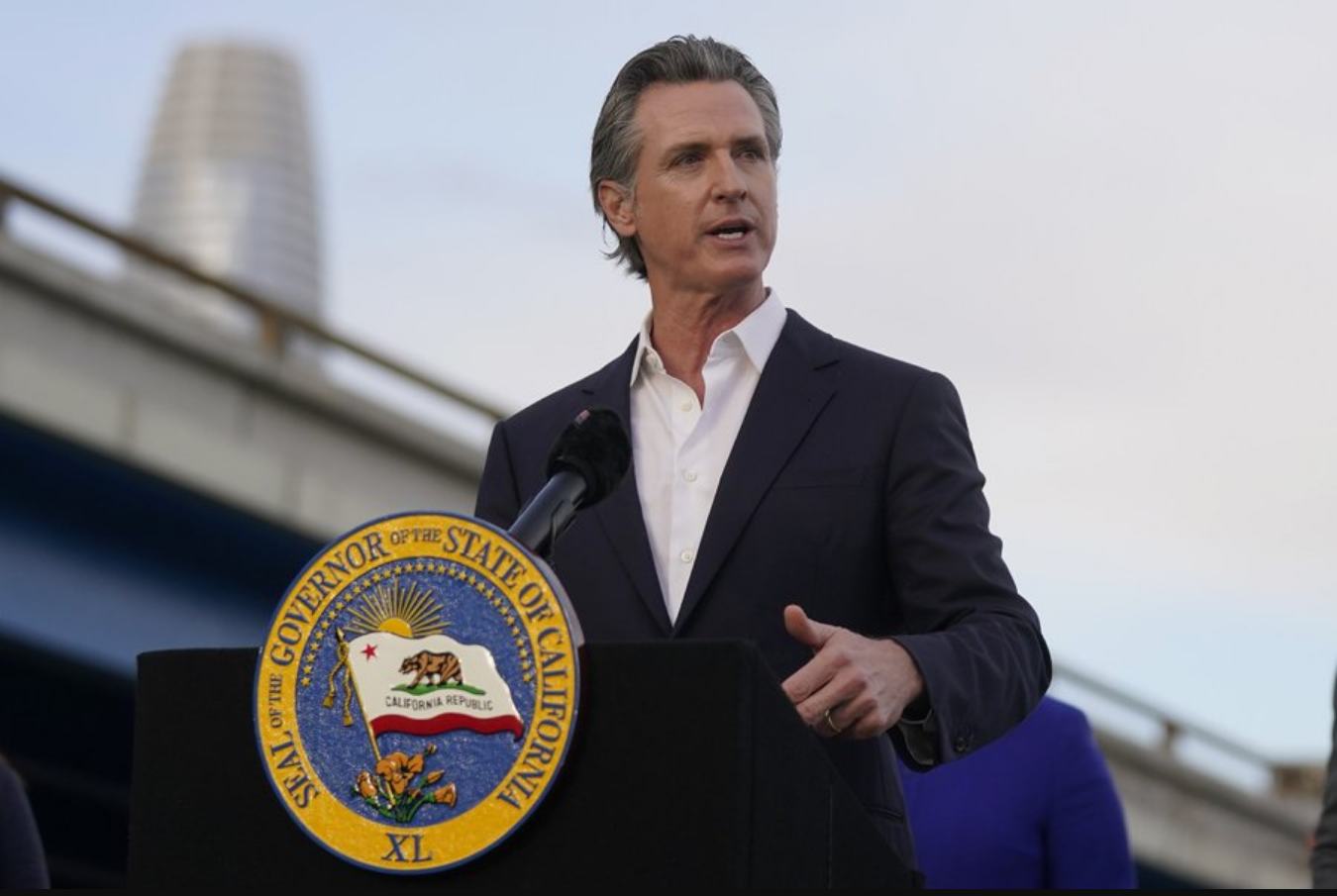
Gov. Gavin Newsom expressed support for LGBTQ suicide hotline measures for K-12 students in direct response to recent reports that Secretary of Health and Human Services Robert F. Kennedy Jr’s., plans to cut funding for the national nonprofit that provides the resource to LGBTQ people.
“Cutting off kids’ access to help is indefensible. While the Trump administration walks away from its responsibility, California will continue to expand access to life-saving resources, because the life of every child — straight, gay, trans — is worth fighting for,” said Gov. Newsom.
Assembly Bill 727, introduced by Assemblymember Mark González, would aim to facilitate pupil and student safety by requiring schools and institutions to have the telephone number and text line for a specified LGBTQ suicide hotline provided by The Trevor Project, that is available 24 hours per day, 7 days per week.
Existing law that will be enforced July 1, 2025, requires a public or private school that serves pupils in any of grades 7 to 12, inclusive, and that issues pupil identification cards to have printed on the identification cards the number for the 988 Suicide and Crisis Lifeline.
This bill would additionally require the list of K-12 public schools and institutions to provide support to youth and their families who have been subjected to school-based discrimination, harassment, intimidation or bullying on the basis of gender identity, sexual orientation or gender expression.
Conservative organizations like the California Family Council are pushing back on this bill, stating that this bill is “forcing LGBTQ advocacy on every student ID — no exemptions for religious schools,” and saying it “undermines families.”
A national 2024 survey by The Trevor Project on mental health of LGBTQ young people, reports that 1 in 10 young LGBTQ-indetifying people in the United States attempted suicide in 2023. Over a third of LGBTQ young people seriously considered suicide within the past year and that figure was even higher for trans and nonbinary-identifying youth, with that figure being 46%.
The survey also found that half of LGBTQ youth who wanted mental health resources and care could not get them. Over 50% of survey respondents answered “a lot” when asked about how often recent politics negatively impact their well-being.
The Trevor Project is one of the nonprofit organizations that is currently at high-risk for losing their funding under Trump’s budget cuts.
The phone number to call for help is 1-866-488-7386 and the number to text for help is 678-678, or you can send them a message at the site link.
-

 Breaking News3 days ago
Breaking News3 days agoMajor victory for LGBTQ funding in LA County
-

 Features3 days ago
Features3 days agoKoaty & Sumner: Finding love in the adult industry
-

 Commentary1 day ago
Commentary1 day agoBreaking the mental health mold with Ketamine: insights from creator of Better U
-

 Miscellaneous2 days ago
Miscellaneous2 days agoCan you really find true love in LA? Insights from a queer matchmaker
-

 El Salvador3 days ago
El Salvador3 days agoLa marcha LGBTQ+ desafía el silencio en El Salvador
-

 Arts & Entertainment2 days ago
Arts & Entertainment2 days agoIntuitive Shana gives us her hot take for July’s tarot reading




